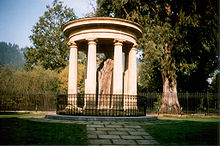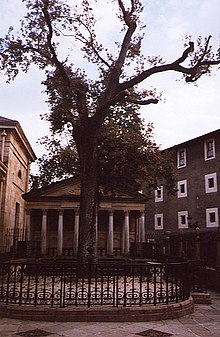Guernica
![]()
This article is about the city of Gernika/Guernica; for the painting of the same name by Pablo Picasso, see Guernica (painting); for the film by Emir Kusturica (1978), see Guernica (film).
Gernika [geɾˈnika] (officially Basque Gernika-Lumo, Castilian Guernica y Luno) is a city of specific historical-political importance in the Spanish autonomous region of the Basque Country (Basque Euskadi). From the 14th to the 16th centuries, Castilian kings would travel to Gernika in the first year after coming to power to take an oath to uphold Basque liberties, or fueros. Subsequently, Gernika was not only the administrative centre of Bizkaia, but also became the sacred city of the Basques, with the "Tree of Gernika" as a symbol of freedom.
On April 26, 1937, during the Spanish Civil War, fighter planes of the German Condor Legion and the Italian Corpo Truppe Volontarie flew the air raid on Guernica with explosive, fragmentation and incendiary bombs. Several hundred people, almost all of them civilians, were killed in the large-scale fires that followed. In the same year, Pablo Picasso created the painting Guernica or The Horrors of War for the Paris World's Fair, which made Guernica's destruction a symbol of war's despicability known throughout the world. In Spain and Germany, on the other hand, it was only after the end of Francisco Franco's dictatorship, beginning in the late 1970s, that historical reappraisal of the events and steps toward reconciliation took place. Gernika's Peace Museum, opened in 2003, is also a peace research centre.
The outer main belt asteroid (2293) Guernica, discovered on March 13, 1977, was named after the city.
Geography
Gernika is located northeast of Bilbao (Bilbo) and belongs to the province of Bizkaia. The Municipio Gernika-Lumo consists of the city of Gernika and the suburb of San Pedro de Luno, 1.5 km away. Its convenient location on the Oka River made Gernika a regional commercial center in earlier centuries. With just over 16,000 inhabitants, the city on the Camino de la Costa (Way of St. James on the Coast) is not one of the larger Basque cities today.

Trunk of the old "Tree of Gernika" set as a monument
Historical rallying point of Basque identity
Already in the Middle Ages, says Michael Kasper, the people's representatives of the province would have gathered under the holy tree, the oak of Gernika, for the consultation of all pending economic, social and political questions. The Castilian rulers, who guaranteed Basque liberties anew, were assured of the province's allegiance. After the 16th century, the rulers refrained from this journey, but continued to assure the observance of the Fueros through their deputies. In addition to the provincial government and the crown's deputy, other important public figures also settled in Gernika, which thus developed into "an elegant small town with capital city flair".
Wilhelm von Humboldt also saw in Gernika in 1801 the administrative center of Bizkaia, "since all public negotiations always begin with the words: so el arbol de Guernica, under the tree of Guernica." Of the tree encountered on the spot, Humboldt commented, "One wished to see an oak tree, venerable by its age and rich in foliage, in a beautiful open rural space, in order to be able to recall more vividly those times when the affairs of a nation were decided more simply than now scarcely those of a family. Alone, indeed, one finds a rather large, but nothing less than gristly holm-oak, with a wind-twisted burst trunk, and a few withered branches, a picture, if one will, of the constitution, which has also withstood many a storm, but has also succumbed to some, and has degenerated in more than one piece from its original form. Beside the tree proper, some younger ones are planted, to replace that one at once, if it should run out." Even Jean-Jacques Rousseau, after a visit to the city, had noted, impressed: "In Guernica live the happiest people. They manage their affairs by a body of peasants under an oak tree, and always they behave wisely."

Oak from Gernika
Search within the encyclopedia